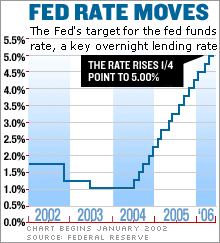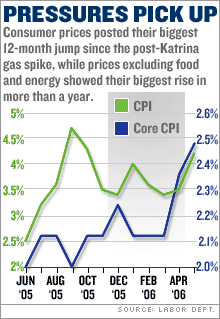New fear: A Fed gone too far
OK, another rate hike is baked in. The worry now is whether the Fed will overshoot and cripple the economy.
NEW YORK (CNNMoney.com) - The debate about the Fed and rates is over. Long live the new debate. Any remaining question about whether the Federal Reserve would raise interest rates again later this month appeared to end at 8:30 a.m. ET Wednesday, when the government's Consumer Price Index again showed more inflation pressures than forecast.
A 17th straight quarter-percentage point increase in the fed funds rate, the Fed's key short-term rate target, to 5.25 percent, is now seen as all but certain by investors and economists alike. The debate has now quickly shifted to how high the Fed will go before ending its rate-hiking campaign, which turns two years old this month. The obvious next question then becomes whether the central bank will "overshoot" and hobble economic growth as it tries to keep a lid on price pressures - or even possibly cause a recession. At least one economist, Rich Yamarone, director of economic research at Argus Research, said he could see the fed funds rate as high as 6 percent by the end of the year if inflation doesn't cool off soon. That would suggest four more quarter-percentage point rate hikes at the Fed's five remaining meetings this year. "I've been thinking since October that the Fed was going to 5.5 percent," said Yamarone, who added he isn't yet ready to forecast a 6 percent rate, only that he sees an increased likelihood of rates that high. "If we continue to see these hot monthly inflation reports, the Fed definitely will have to go longer and stronger," he said. And the possibility of significantly higher rates was what was worrying some on Wall Street Wednesday. "We don't really fear inflation, we fear the medicine," said Art Hogan, chief market analyst at Jefferies & Co. "The real fear is that the Fed goes too far and really slows the economy down more than we would like to see. The medicine, if you take too much of it, can cause a recession." Already higher than neutral?
Some economists argue that the Fed may have already gone past "neutral" in setting short-term rates; a so-called neutral fed funds rate would neither spur nor slow the economy. Jeoff Hall, chief U.S. economist at Thomson Financial, said he would put the neutral rate at about 2 percentage points above the core rate of inflation, which strips out volatile food and energy prices. Even with the core CPI rising to 2.4 percent in Wednesday's report, that suggests the Fed passed neutral two or three rate hikes ago. But even Hall said the Fed isn't wrong to be raising rates in an effort to reign inflation, even if it means a slowdown in the economy. "It's just that inflation is so in your face right now, the Fed can't run from it," said Hall. "The alternative is definitely worse. The ignition of inflation is something the Fed wants to avoid at all cost. A 5.25 percent rate is the right medicine, even if it's tough to take resulting slowdown." Hall said he believed a 5.25 percent rate would increase the odds of a recession and further hikes will increase that risk, but neither he nor most other economists are ready to predict one. Yamarone said he believed the economy is strong enough to continue growing even with a 6 percent fed funds rate. "We've been there before in recent history. I don't think that (6 percent fed funds rate) is something to alarm us," he said. "Of course trying to get the market to believe that might be a different story." But some economists say Ben Bernanke and fellow Fed policy-makers will do everything they can to pause from raising rates, even if future inflation numbers keep showing some price pressure. They say they central bankers are aware that inflation generally doesn't peak until several months after the Fed stops raising rates, at least. "This Fed knows fairly well that there are lag effects. They know what they've done already has yet to be reflected in the economy," said Stuart Hoffman, chief economist, PNC Financial. "If they get to 6 percent or higher, that is too high. They won't take rates that high unless inflation is much worse than anyone expects." But even Hoffman conceded the Fed has a history of raising rates too far in its past efforts to put on the brakes. "The problem is you never know if you've gone too far until you get there," he said. Related: Prices rise more than expected Related: Fed sees signs of cooling economy
Special Report: Eyes on the Fed |
| ||||||||||||||||



